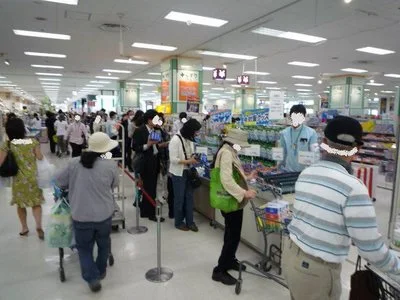Being from Korea, he knows well that the physical difference between most of the East Asians and Japanese is almost zero, especially with the northern Chinese and Koreans. The looks are similar, but when he says the attitude and behavior is different I had to agree. How can I, better than him be able to differentiate similar looking people. The race is same, the physical appearances are same, but there are still elements that separate Japanese people from others.
The culture, the language, the behavior, the response towards events etc are different. This does not mean that Japanese people are free from all kinds of bad manners or they are extra ordinarily obedient or disciplined. When I say from my own experience that Japan is clean, people are disciplined, law obedient, well-mannered, free from social crimes, I never mean that Japanese society is one hundred percent free from all kinds of dirt, indiscipline, law breakings, ill-manners, anti-social activities etc.
There may be bad people in Japan as it is with any society. There are dirty things, there are unclean areas, there are violations of law and rules, there are aggression in the public places, there are murders, rape, child abuse, there are drunken people shouting in public places, hundreds of cases of anti-social activities reported from Japan and thus goes the list of all bad things in society just the same way like in any other society. Japanese people are not extra-ordinary people in the sense that they are just like the same kind of human race as is with any other human population. Japanese people are extra-ordinary in their attitude to eliminate or free themselves from many of the evils in our societies. That attitude makes the difference. That attitude of Japanese people reflects in their whole education system and social fabric.
It is just that! But this is the great thing with any human population. The attitude and nature of majority of Japanese people are warm, welcome, pleasant and optimistic towards others and their own life. Is it not the same with other east Asians? Are they not warm and pleasant? Of course, Yes. They are also good and their societies are also warm. Just the percent of that elevated class of human beings are more in Japan. This makes the difference and projects Japan in a well frame to the rest of the world.
Choi bun-san had his own versions to justify his observations. I have very few opportunities to know more deep about the real Japanese psyche.
Who is bad and who is right? How can we judge people without any prejudice? When we make standards for measuring or observing or judging other characters, always those standards will be affected by our own views. Then those standards cease to be neutral. In fact, there may not be any neutral standards by which we can measure human beings and their behavior. We are not better judges of anybody.
It is heavily raining outside as I started recollecting the conversations with Choi bun-san. Today’s News paper head lines carry the news of war planes reached from America to Japan.
Japanese society has been peaceful and quiet for many years. The life here is also peaceful and calm. Japanese society is well taught to respect each other and respect strangers. The Bushido culture teaches to respect the enemy too. Historical evidences shows the fighting communities within Japan respected each other in war.
Napoleon Bonaparte, after capturing Russia, decided to return back without touching China. The reason he told to his military was that it is a sleeping monster. Sleeping does not mean weakness. Japan is not weak only because Japanese people love peace.















